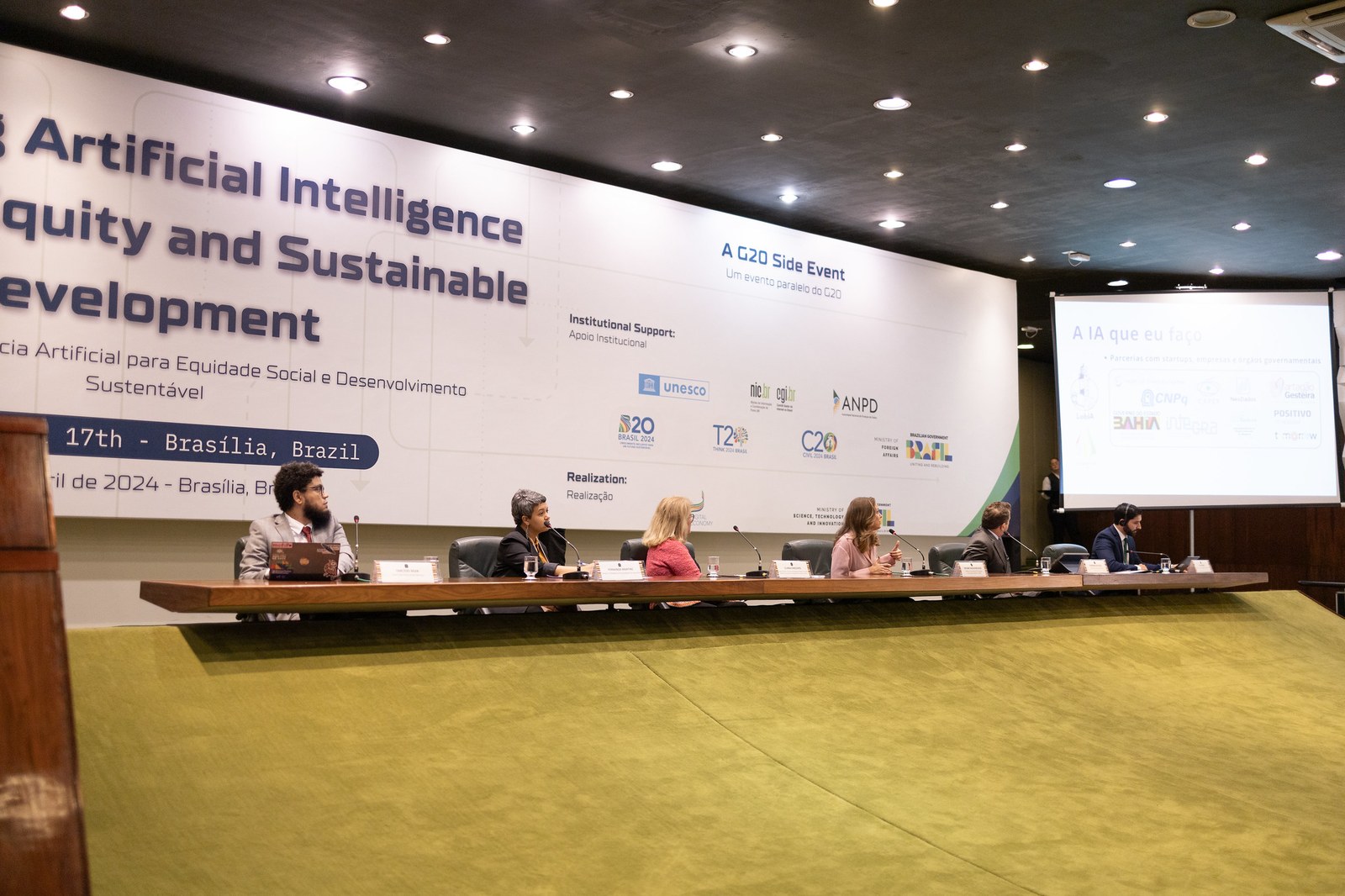Discussion at the G20 centered on the inequality in Artificial Intelligence infrastructure
A panel at the G20 Brasil side event addressed the challenges of developing infrastructure in a balanced manner across the G20 countries and the Global South. This meeting is part of the Digital Economy Working Group’s initiative.

On April 17, 2024, in Brasilia, a side event at G20 Brasil tackled the challenges of uneven distribution of Artificial Intelligence (AI) assets and infrastructure, exploring potential solutions for governments, the private sector, and civil society. This meeting, under the umbrella of the G20 Dialogues and facilitated by the Digital Economy Working Group, convened global experts to deliberate on "Artificial Intelligence for Social Equity and Sustainable Development."
Eliana Emediato, General Coordinator of Digital Transformation at the Brazilian Ministry of Science, Technology, and Innovation (MCTI), explored the challenges associated with developing robust AI infrastructures, high-speed Internet access, computing resources and data storage capacities. Emediato emphasized the importance of ensuring equal participation and benefits for all G20 nations in the deployment of AI Technologies, while also adhering to environmental constraints.
AI development in the Global South
Fernanda Martins, Director of Research at InternetLab, emphasized that Artificial Intelligence poses challenges to the development and sustainability of democracies, highlighting the importance of discussing AI governance. "Given the current historic moment and the rise of authoritarian governments around the world, examining a technology of such magnitude underscores the critical need for a discerning approach, social responsibility, and partnership between countries to ensure the ethical use of AI," stated the Director of Research.
For Martins, the Global South represents the majority of the world's population and its data is extracted for the benefit of a minority that historically gains from technological advancements. Therefore, regulatory discussions must take a comprehensive approach, considering factors such as race, gender, sexuality, social status, territorial distinctions, and national identity.
"The present moment brings hope for many countries, especially those in the Global South, affected by climate change and hunger. These countries pin their hopes on Artificial Intelligence, seeing its development as a pathway toward forging a new ethical framework for technology. By establishing infrastructures that strengthen democracies in countries that have been called the global majority,” remarked the Director.
Tarcízio Silva, Senior Technology Policy Fellow at Mozilla, addressed the environmental impacts of building AI infrastructure, including mining activities and the reliance of Global South countries on major technology companies. Silva stressed the G20's significance as a forum for expanding discussions on technological advances and optimizing the use and distribution of infrastructure, particularly through collaborative sharing initiatives.
Inequalities in AI infrastructure
Tatiane Nogueira, a machine learning researcher and Professor at the Federal University of Bahia, distinguished between two types of AI, stating, "The one we want is the extremely futuristic one for a highly connected and super intelligent 5.0 society. When what we need is AI that helps us," highlighting the contrast between the desired futuristic vision and the practical assistance required for everyday tasks and enhanced accessibility.
According to research, AI infrastructure is very expensive and distributed unevenly, with significant recent investments directed towards infrastructure, research and governance. "But for the AI we need, collaboration between industry and academia is essential. We can't do that here, but it's already happening abroad. The race for AI is both commercial and scientific, which is why big tech is very present in research," explained the researcher.
AI and inclusive growth
Fernando de Rizzo, CEO of Tupy and representative of the Business 20 (B20) engagement group, believes that inclusive growth is part of Brasil's proposal to the G20. He argued that the B20 should focus its work on the impacts and challenges of AI transformation rather than on the development of technologies. The G20 Digital Economy Working Group will propose recommendations that can cause transformation and propose sustainable and ethical inclusive progress. "For the first time, artificial intelligence will formally be part of the group's recommendations," stated the CEO.
Luiz Aranda, CEO of the Organization for Economic Cooperation and Development (OECD), presented the results of the organization's technology research group. Aranda pointed out that countries need an effective computing plan, and that means having the skills and political environment to effectively access and use advances in computing. Another important point is sustainability: in 2022, the world's data centers consumed more electricity than some OECD countries, such as Italy and Norway.
However, this energy consumption has remained practically constant, at around 1% of global energy demand over the last decade. The explanation for there being no increase in electricity consumption is the fact that hardware efficiency has improved over time. According to Aranda, "only by finding these efficiencies will we be able to make the development of advanced systems sustainable, accessible to emerging economies such as the BRICS countries (Brasil, Russia, India, China, and South Africa). This will also help them develop their own digital sovereignty as they move forward."